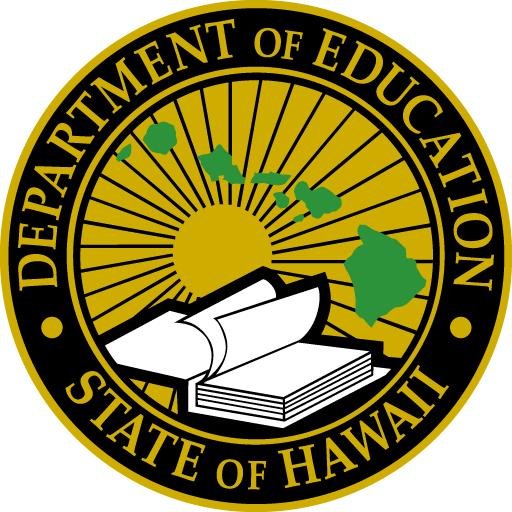E ola pono.E mālama i nā piko.
生活 pono。培養欣欣向榮的人際關係。
While the primary focus of health education is the development of health skills, these skills must be addressed in conjunction with functional information in the context of priority risk topics. Standards-based health education must be age and developmentally appropriate, medically accurate and provide factual information in all priority risk topics:
- Mental and emotional health
- Healthy eating and physical activity
- Personal health and wellness
- 安全(預防意外傷害)
- 預防暴力
- 預防吸煙
- 預防酒精和其他藥物的使用
- Sexual health and responsibility
筆記: 健康教育 in prekindergarten is aligned to the 夏威夷早期學習與發展標準 (HELDS).
課程要求
- 健康教育 is required in all elementary grades.
- Middle/intermediate schools must offer courses that allow all students to meet Hawaiʻi՚s health education standards and performance indicators for grades 6-8. One semester (0.5 credits; 60 hours) of health education in each middle/intermediate school grade is strongly recommended but not required.
- In high school, a one semester course (0.5 credits; 60 hours) in health education is required for graduation.
- A variety of health specialized elective courses (e.g., peer education) are available at the secondary school level.
- 有關國中升學和高中畢業的要求,請參閱 董事會政策 105-1 學術計畫 (PDF), Board Policy 102-9 Middle Level 教育 Promotion Policy (PDF), 和 董事會政策 102-15 高中畢業要求和畢業典禮 (PDF).
wellness guidelines for 健康教育
Comprehensive health education provides the instructional foundation that prepares students to build healthy relationships and make lifelong healthy decisions. The 健康指南 support quality health education grounded in Hawaiʻi.
The wellness guidelines for health education are organized around 三個關鍵組件 that address instructional minutes, include nutrition education, and emphasize culturally relevant and ʻāina-based approaches:
- Instructional content of health education classes includes a focus on knowledge and skills that support healthy eating and is aligned with the HIDOE standards for health education.
- 健康教育 is provided to students in elementary grades at least 45 minutes per week and secondary grades at least 200 minutes per week.
- Nutrition education includes culturally relevant activities that are ʻāina-based and hands-on, such as food preparation, taste-testing, farm visits and school gardens.
Sexual 健康教育
Comprehensive sexual health education helps students understand and navigate their development and growth as they progress from childhood through puberty and adolescence. Effective, comprehensive sexual health education provides students with the age-appropriate, medically accurate content and skills to know and be able to communicate for healthy relationships, access resources and support, and make healthy decisions.
Several state laws and policies help prevent teen pregnancy and the spread of sexually transmitted infections through comprehensive sexual health education.
- 國家法律 (夏威夷修訂成文法 (HRS) §321-11.1) establishes requirements for any state-funded sexual health education program.
- Board Policy 103-5 Sexual 健康教育 (PDF) requires the Department to implement comprehensive sexual health education.
- 學校所採用的課程描述應提供給家長/法定監護人,並應在任何教學開始之前發佈在學校網站上。
- A student shall be excused from sexual health instruction only upon the prior written request of the student’s parent or legal guardian.
- 如果學生的父母或法定監護人提出書面請求,學生可能不會受到紀律處分、學術處罰或其他制裁。
家長或法定監護人也可以選擇不讓子女參加與以下項目相關的教學 爭議性問題.
父母或法定監護人可以寫信給學校管理人員或老師,要求將其孩子排除在特定的課程或活動之外。如果收到這樣的信件,必須提供學生替代的學習活動。父母或法定監護人有義務在課程或活動開始前通知學校管理人員或老師。
建議的教學材料:
進一步了解 Sexual 健康教育 in the HIDOE (PDF)
Sexual Violence Prevention 教育
Teaching students about sexual violence prevention is essential for nurturing safe and caring schools and communities. It equips students with information and skills that promote healthy relationships and respect for others. It also helps students understand how to seek support if they or someone they know experiences sexual violence.
向學生提供以預防為導向且適合其成長的性暴力預防教學:
- 身體自主(例如,身體意識和安全、同意、界限)、
- 識別和報告性虐待,以及
- 可取得的資源 (例如:可信賴的成年人、社區資源)。
部屬學校將負責在其面向公眾的網站上提供課程說明。在對學生開始教學之前,學校會通知家長和法定監護人即將開始的教學、如何預覽學校的教材,以及選擇退出的程序。
只有在學生家長或法定監護人的事先書面請求下, 學生才可以不參加預防性暴力教育。如果學生家長或法定監護人提出書面請求,則該 學生不得受到紀律處分、學業處分或其他處罰。
核准的教材:
- Elevatus Training Curriculum: Sexuality 教育 for People with Developmental Disabilities, Adapted for People with High Support Learning Needs (PDF)
- 對抗虐待兒童 (PDF)
- 健康智慧 (PDF)
- 瘋狂帽子健康課程 (PDF)
- NetSmartz (PDF)
- 正面預防 PLUS、特殊族群 (PDF)
- 權利、尊重、責任 (PDF)
- 第二步兒童保護單位 (PDF)
- 性虐待治療中心的性虐待預防課程 (PDF)
進一步了解 HIDOE 的性暴力預防.
general health education 資源
- Why 健康教育 Matters (Google Doc)
- 健康教育 Standards and Topics Overview (Google Doc)
- Learning Design for 健康
- 健康教育 Printables (Google Drive)
- 健康指南
- You Matter! 健康 資源
- Using School Gardens in 健康教育
- Reviewing Instructional Materials for 健康教育 (PDF)
- 2022 Hawaiʻi School 健康 Profiles – Highlights Report (PDF)
美國農業部非歧視聲明
根據聯邦民權法和美國農業部 (USDA) 民權法規和政策,本機構禁止基於種族、膚色、國籍、性別(包括性別認同和性取向)、殘疾、年齡或對先前民權活動的報復或報復而進行歧視。
該計劃的資訊可能以英語以外的其他語言提供。需要其他溝通方式(如點字、大字印刷本、錄音帶、美國手語)獲取計劃資訊的殘疾人士,應聯繫負責管理該計劃的州或地方機構,或致電美國農業部 TARGET 中心(電話:(202) 720-2600(語音和 TTY),或透過聯邦中繼服務(電話:(800) 87777-39)聯繫美國農業部。
要提出項目歧視投訴,投訴人應填寫表格 AD-3027(美國農業部項目歧視投訴表),該表格可從以下網址在線獲取: https://www.usda.gov/sites/default/files/documents/USDA-OASCR%20P-Complaint-Form-0508-0002-508-11-28-17Fax2Mail.pdf如需協助,可從任何美國農業部辦事處獲取,可致電 (866) 632-9992,或寫信給美國農業部。信函中必須包含投訴人的姓名、地址、電話號碼以及涉嫌歧視行為的書面描述,其詳細程度足以告知民權事務助理部長 (ASCR) 涉嫌侵犯民權的性質和日期。填妥的 AD-3027 表格或信函必須透過以下方式提交給美國農業部:
- 郵件:
美國農業部
民權事務助理部長辦公室
西南獨立大道 1400 號
華盛頓特區 20250-9410;或者 - 傳真:
(833)256-1665 或(202)690-7442;或者 - 電子郵件:
[email protected]
該機構是一個平等機會提供者。

